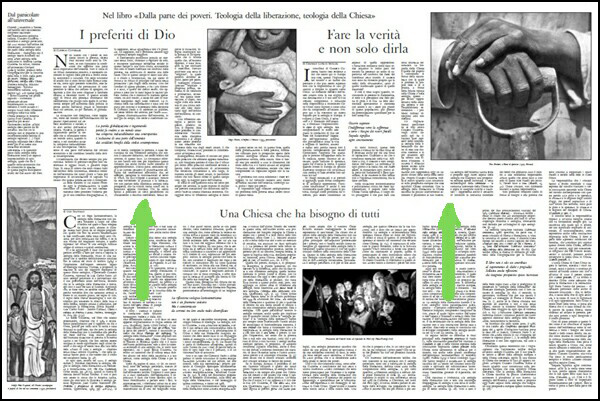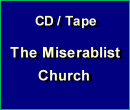Documents for your files
 |
PROGRESSIVIST DOCUMENT OF THE WEEK
Archbishop Müller Promotes
Liberation Theology & Gustavo Gutierrez
Liberation Theology & Gustavo Gutierrez
Today we post the second article published by L'Osservatore Romano in its September 4, 2013, issue (pages 4 & 5). It is the article by the Prefect of the Congregation for the Doctrine of the Faith, Archbishop Gerhard Müller. (First part here).
In it the head of the CDF praises Gustavo Gutierrez and Liberation Theology as much as possible. He depicts a melodramatic general milieu of poverty in South America, which hardly corresponds to reality, in order to raise a sentiment of guilt in Europeans and justify Liberation Theology.
The pretext for L'Osservatore Romano to publish the two articles is the July 2013 launching of the Italian translation of the book Taking the Part of the Poor, originally published in German in 2004.
The two articles were placed side-by-side as shown in the two-page photocopy in the last row below.
Today, we offer our readers a photocopy of Muller's article with our translation of the highlighted parts. Last Saturday we posted the article by Fr. Gustavo Gutierrez.
Below, is a photocopy of the article by Archbishop Muller in L'Osservatore Romano. This document is preceded by our translation from the Italian in blue, of the parts marked in green in the original.
In it the head of the CDF praises Gustavo Gutierrez and Liberation Theology as much as possible. He depicts a melodramatic general milieu of poverty in South America, which hardly corresponds to reality, in order to raise a sentiment of guilt in Europeans and justify Liberation Theology.
The pretext for L'Osservatore Romano to publish the two articles is the July 2013 launching of the Italian translation of the book Taking the Part of the Poor, originally published in German in 2004.
The two articles were placed side-by-side as shown in the two-page photocopy in the last row below.
Today, we offer our readers a photocopy of Muller's article with our translation of the highlighted parts. Last Saturday we posted the article by Fr. Gustavo Gutierrez.
Below, is a photocopy of the article by Archbishop Muller in L'Osservatore Romano. This document is preceded by our translation from the Italian in blue, of the parts marked in green in the original.
From the book Taking the part of the poor.
Liberation Theology, Church theology
To practice the truth and not just speak it
Gerhard Ludwig Müller
The works by Gustavo Gutierrez have made one thing evident to us Europeans: injustice in the world is a factor that continues to exist and can only be overcome by everyone being disposed to turn his eyes toward Christ. …
Turning toward Jesus Christ – the liberator of humanity – … has become the indispensable tòpos [subject of study] for every theology. But do we adequately comprehend the living conditions in the countries of South America? Do we know that oppressive poverty daily takes the lives of thousands of children, the elderly and the sick only because they lack the bare minimum to live? Are we aware of the anguish that afflicts persons trapped in their illnesses, often obliged to accept, as their only hope, death as an exit, when in fact a small operation in Europe using basic medical equipment could have saved their lives? …
In many parts of the world, the education received in schools of the past generated a sense of superiority over the countries of the so-called Third World. Is it not precisely here that we find the roots of an intellectual as well as material exploitation? …
This everyday suffering is the reality that makes the people of South America ask for their daily bread in the Our Father. What moves their lips is not an opulent consumerism, but a terrible hunger.
In the politically and economically critical situation of the Latin American countries, people see the Church as the only hope, the only place to protect themselves and have some existential security. …
A special thanks goes to my friend Gustavo Gutierrez. In the last decades he has carved the cornerstones of the so-called Liberation Theology to make it a coherent doctrine, and, on many occasions, he offered an overview of it. And yet the often ardent debate on Liberation Theology is still not a closed chapter in the history of theology. … With Liberation Theology, pluralism has grown inside the Church.
The theology of Latin America today reveals and proposes new aspects of the theology that integrates an often paralyzed European theology. The theological theme of communio – the universal community of the Church that is above ethnic and national categories – is also an attempt to lead the community of the faithful around the world toward a responsible solidarity. … As Christians we should not shirk this responsibility.
We cannot remain blind to the needs and poverty that our brothers and sisters in the faith in Jesus are obliged to endure.
The responsibility that Christians have in the world was expressed by Council Vatican II. …
The sole Church of Jesus Christ overcomes the barriers, crosses the national, ethnical and political walls and leads men … to the unity of all mankind. (LG 1) The Bible describes Christ as the savior who brings liberation .. He frees man from sin – both personal and structural, which ultimately … is the cause of all injustice and all oppression. Only Christ makes us free … Based on this liberty we are called to help people, since each and every poor person in need is our neighbor.
Thus, I hope this book will be a contribution to overcome indifference toward the sufferings and needs of our brothers and sisters, and also a system to give the correct interpretation of Liberation Theology. It brings our gaze to Christ, who, as our Savior and Redeemer, is the goal toward which we always tend. Gustavo Gutierrez once said, in an absolutely simple and biblical way: “To be Christian means to follow Christ.”
To follow means to act concretely. … To practice the truth brings us to take the side of the poor.
Liberation Theology, Church theology
To practice the truth and not just speak it
Gerhard Ludwig Müller
The works by Gustavo Gutierrez have made one thing evident to us Europeans: injustice in the world is a factor that continues to exist and can only be overcome by everyone being disposed to turn his eyes toward Christ. …
Turning toward Jesus Christ – the liberator of humanity – … has become the indispensable tòpos [subject of study] for every theology. But do we adequately comprehend the living conditions in the countries of South America? Do we know that oppressive poverty daily takes the lives of thousands of children, the elderly and the sick only because they lack the bare minimum to live? Are we aware of the anguish that afflicts persons trapped in their illnesses, often obliged to accept, as their only hope, death as an exit, when in fact a small operation in Europe using basic medical equipment could have saved their lives? …
In many parts of the world, the education received in schools of the past generated a sense of superiority over the countries of the so-called Third World. Is it not precisely here that we find the roots of an intellectual as well as material exploitation? …
This everyday suffering is the reality that makes the people of South America ask for their daily bread in the Our Father. What moves their lips is not an opulent consumerism, but a terrible hunger.
In the politically and economically critical situation of the Latin American countries, people see the Church as the only hope, the only place to protect themselves and have some existential security. …
A special thanks goes to my friend Gustavo Gutierrez. In the last decades he has carved the cornerstones of the so-called Liberation Theology to make it a coherent doctrine, and, on many occasions, he offered an overview of it. And yet the often ardent debate on Liberation Theology is still not a closed chapter in the history of theology. … With Liberation Theology, pluralism has grown inside the Church.
The theology of Latin America today reveals and proposes new aspects of the theology that integrates an often paralyzed European theology. The theological theme of communio – the universal community of the Church that is above ethnic and national categories – is also an attempt to lead the community of the faithful around the world toward a responsible solidarity. … As Christians we should not shirk this responsibility.
We cannot remain blind to the needs and poverty that our brothers and sisters in the faith in Jesus are obliged to endure.
The responsibility that Christians have in the world was expressed by Council Vatican II. …
The sole Church of Jesus Christ overcomes the barriers, crosses the national, ethnical and political walls and leads men … to the unity of all mankind. (LG 1) The Bible describes Christ as the savior who brings liberation .. He frees man from sin – both personal and structural, which ultimately … is the cause of all injustice and all oppression. Only Christ makes us free … Based on this liberty we are called to help people, since each and every poor person in need is our neighbor.
Thus, I hope this book will be a contribution to overcome indifference toward the sufferings and needs of our brothers and sisters, and also a system to give the correct interpretation of Liberation Theology. It brings our gaze to Christ, who, as our Savior and Redeemer, is the goal toward which we always tend. Gustavo Gutierrez once said, in an absolutely simple and biblical way: “To be Christian means to follow Christ.”
To follow means to act concretely. … To practice the truth brings us to take the side of the poor.











